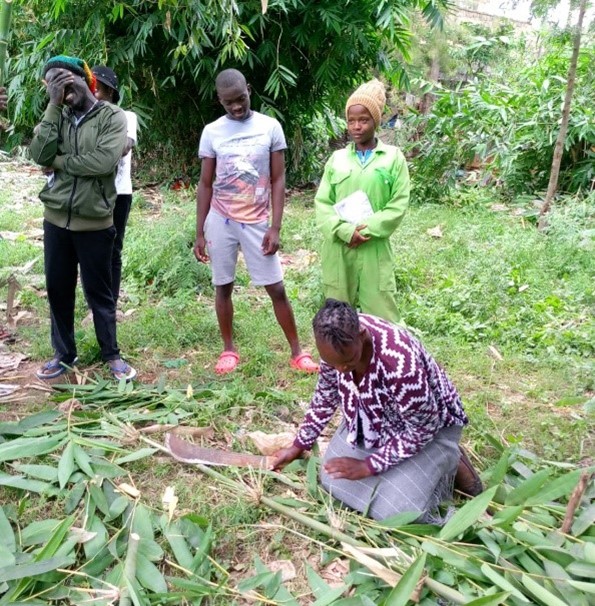Many urban households and businesses rely on charcoal and kerosene for cooking, contributing to deforestation and carbon emissions. Bamboo briquettes offer a sustainable and eco-friendly alternative, produced from renewable bamboo resources. The project aims to utilize bamboo waste for briquette production, involving youth groups in bamboo propagation and encouraging environmental conservation. This initiative not only reduces carbon emissions but also promotes economic empowerment and proper waste management, contributing to a greener planet and river restoration efforts.
Bamboo briquettes

Most urban households, schools, institutions, eateries and small businesses depend on charcoal and kerosene as the primary source of fuel energy for cooking. The charcoal is produced inefficiently and in unsustainable manner, that always involves cutting down of trees causing deforestation thus contributing to global warming. Kerosene is also a source of carbon emission in the atmosphere. The price of fuel especially in urban settlements continue to rise and are subject to seasonal fluctuation as firewood and charcoal becomes increasingly unavailable due to excessive tree cut down.
Bamboo briquette contains zero chemicals, and does not produce smoke compared to petroleum fuel and traditional charcoal from tree, making them most eco-friendly form of fuel. The bamboo briquette is produced from fast growing renewable resource that absorb carbon dioxide from the atmosphere during growth, make it more eco-friendly choice of fuel, thus contributing to greener and healthier planet. Bamboo briquette produce less fumes and smokes compared to wood charcoal, that help in reducing respiratory diseases caused by smoke and dust, since bamboo plant is the biggest source of carbon sink in the ecosystem. Bamboo has potential of creating various economic opportunities, as fuel, plant and seedlings among other benefits. The project aims at encouraging youth groups working on environmental conservation to propagate and plant bamboo in their spaces, to ensure constant supply of the by-product, as a source of economic empowerment to the youth.
Establishing a bamboo briquette production plant would require adequate technical resources, which can be supplemented by engaging and training youth and women groups in bamboo propagation and nursery management. The initiative has the potential to create economic empowerment opportunities for youth and women groups through bamboo propagation and briquette production. Incorporating agricultural waste products could further enhance economic viability and proper waste management practices. Ensuring compliance with environmental regulations and forest conservation laws would be critical to the success and expansion of the initiative. Potential challenges may include market competition, access to resources, and community engagement. More details on potential risks and barriers would be beneficial for a comprehensive analysis.
Set up a bamboo briquette production plant in Baba Dogo, to help provide economic empowerment, to help provide clean energy. Train and encourage youth and women groups to star up bamboo propagation and nursery management projects, as economic empowerment and to ensure project sustainability.
The project seeks to upgrade the bamboo initiative into a value addition to use the bamboo product and waste to producer briquette for alternative energy from charcoal, firewood and kerosene. Green Oasis Lens is involved in bamboo propagation and nursery management and as part of carbon sink the organization has grown bamboo grasses along the Mathare River. The organization has also engaged other youth groups in Mathare, Baba dogo and Lucky summer wards on Bamboo growing activities as part of Nairobi river restoration activities and to ensure constant supply of the by product for sustainability. Bamboo as an alternative to tree cutting has proven to be fastest growing plant and has the power of rejuvenating even after several cuts, even though this option of energy production is not explored much in the country. The project aims at using the residues and leaves that fall from bamboo plants in and around the farm, and other locally sourced agricultural waste feedstock, such as Rice hust, saw dust, coffee husts, maize cobs e.t.c. This will help in reducing tree cutting for fire wood and charcoal production, it will encourage environmental conservation and proper waste management for economic growth.
The initiative has the potential to significantly reduce carbon emissions, promote sustainable fuel alternatives, and contribute to environmental conservation and river restoration activities.

